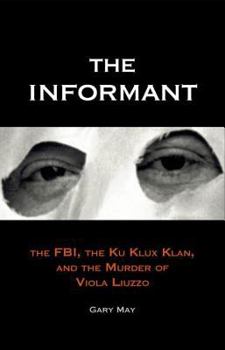The Informant: The FBI, the Ku Klux Klan, and the Murder of Viola Liuzzo
Select Format
Select Condition 
Book Overview
In The Informant, historian Gary May reveals the untold story of the murder of civil rights worker Viola Liuzzo, shot to death by members of the violent Birmingham Ku Klux Klan at the end of Martin... This description may be from another edition of this product.
Format:Hardcover
Language:English
ISBN:0300106351
ISBN13:9780300106350
Release Date:May 2005
Publisher:Yale University Press
Length:448 Pages
Weight:0.35 lbs.
Dimensions:1.4" x 6.4" x 9.5"
Customer Reviews
5 ratings
A Gritty Account of a Terrible Time in Our History
Published by Thriftbooks.com User , 15 years ago
I would highly recommend this book as a companion to Mary Stanton's book, "From Selma to Sorrow." The May account is far more gritty and insistent on exposing the ugliness of both the Liuzzo events and the predjudices of the time. The book is a terrible journey into a land and a time of inner and outer darkness and turmoil.
Great example of historical nonfiction
Published by Thriftbooks.com User , 17 years ago
Exhaustively researched and beautifully crafted, this book provides a much needed insight into the inherent flaws and complication posed by the FBI's informant system. It's historical -- in the sense of looking at historical events -- but it's also extremely relevant to the problems of today.
"I felt I was in the car ..."
Published by Thriftbooks.com User , 18 years ago
Gary May is a talented storyteller and his account of what happened to Viola Liuzzo is riveting. I spent Christmas week with his book in hand, taking every opportune moment to continue learning about this young mother's quest to do something right about the civil rights movement and how she was partly the victim of Hoover's FBI. Often, I felt that I was traveling along with Liuzzo as May's tale unfolded - I felt I was in the car when she was murdered. Great book. Couldn't put it down.
A Dark Chapter of the FBI's Past
Published by Thriftbooks.com User , 18 years ago
Forty years ago, a civil rights movement grew in the south that was opposed by white supremacists who thought blacks should not have equal opportunities in shopping, dining, transportation, and education, and who were ready to use violence to maintain segregation. The murder in Alabama of white civil rights worker Viola Liuzzo on 25 March 1965 got the immediate attention of the nation, and of President Johnson, who was proud to be able to tell the nation twenty-four hours later that the murderers had been caught. It was a killing by Klansmen, but not one of those that went unsolved for decades. The only reason the murderers were caught so quickly is that with them was an informant, the FBI's man who had infiltrated the Birmingham Klan branch and who reported the crime and the criminals immediately. Johnson was proud, J. Edgar Hoover was proud, and the informant, Gary Thomas Rowe, was a hero. The problem is that the story is far more confused and Rowe's heroism and the FBI's tactics are far more questionable than they seemed at the time. In _The Informant: The FBI, the Ku Klux Klan, and the Murder of Viola Liuzzo_ (Yale University Press), history professor Gary May has told an exciting story full of ambiguity and of criticism for the FBI, and has described a long-ago society which accepted that skin color was an individual's most important characteristic. Rowe was recruited by the FBI in 1960; he was a bartender, bouncer and machinist who accurately proclaimed himself a hell-raiser, and so he fit into the Klan. An informant has to act the role of a group member, and this means enthusiastically participating in what the group does, which Rowe did. He worked up the Klan hierarchy and did provide valuable information, but also he participated in brawls along with his fellow Klansmen. He was in the car with three other Klansmen after a Selma-Montgomery march. The shooting wounded a young black civil rights worker and killed the driver, the mercurial 39-year-old mother of five from Detroit, Viola Liuzzo. He was the main prosecution witness in the trial of the other three, but even so, they were eventually found innocent of murder, only being found guilty in federal court of civil rights violations. Rowe's role in the murder is not clearly that of a mere observer and informer. He may have tried to influence the others to call off the chase, but he may also have shot at the car himself, and thus may have been an accessory to the crime. The Liuzzo family was devastated and torn asunder by the murder, and although they had originally joined in the general approbation of Rowe as hero, two decades later they sued the government in a wrongful death lawsuit; the judge threw out the suit because, among other reasons, Rowe was in his estimation not violent or dangerous, but a model public servant. Rowe died in 1998, a bankrupt ne'er-do-well who blamed the FBI for not supporting him in the way he had expected. Liuzzo's story has been largely f
Fascinating and frustrating
Published by Thriftbooks.com User , 18 years ago
Gary May brilliantly tells the story of the murder of civil rights activist Viola Liuzzo on March 25, 1965, and exposes the violent misdeeds of KKK members, who mostly considered themselves to be doing "God's work" when they harrassed, beat, and murdered blacks as well as white citizens who were unfortunate enough to get in the way. The career of the self-centered, attention hungry, redneck informant Gary Thomas Rowe is skillfully retraced, and the ineptitude and negligence of FBI agents and the organization as a whole are exposed. The copy I have is an "advance uncorrected page proof" (review copy) and has frequent spelling and punctuation errors; thus the four star rating. Otherwise, I would have given this book a full five stars, because it is excellent.





